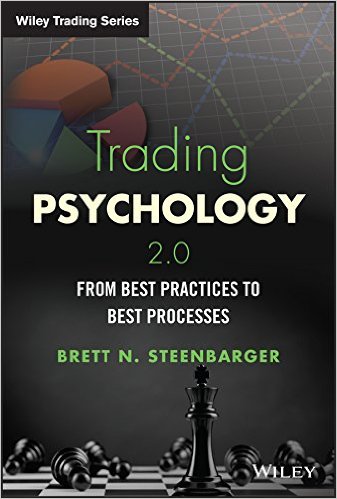 Trading Psychology 2.0 is based on four major themes: Adapting to changing markets; Building strengths; Cultivating creativity; and Developing best practices and processes. Here are fifteen interesting quotes from the book:
Trading Psychology 2.0 is based on four major themes: Adapting to changing markets; Building strengths; Cultivating creativity; and Developing best practices and processes. Here are fifteen interesting quotes from the book:
1. Discipline, while necessary for success, is never sufficient. Discipline does not substitute for skill, talent, and insight. Strict, disciplined adherence to mediocre plans can only lock in mediocre results. If it were otherwise, there would be no losing automated trading systems.
2. It is not enough to find an “edge” in financial markets; as any tech entrepreneur can attest, competitive advantages are perishable commodities. Those who sustain success continually renew themselves, uncovering fresh sources of competitive advantage. That requires processes for assessing and challenging our most basic assumptions and practices. It takes a good trader to create success, a great one to recreate it. Nothing is quite as difficult— and rewarding— as letting go of what once worked, returning to the humble status of student, and arising phoenix-like from performance ashes.
3. This productivity is readily apparent on a day-to-day, week-to-week basis: The greats simply get more done than their colleagues. They organize their time and prioritize their activities so that they are both efficient (get a lot done per unit of time) and effective (get the right things done). How much time do we typically waste as traders, staring unthinkingly at screens, chatting with people who offer little insight, and reading low-priority/ information-poor emails and reports? The successful traders invariably are workhorses, not showhorses: They get their hands dirty rooting through data and make active use of well-cultivated information networks.
4. Successful traders I’ve known work as hard on themselves as on markets. They develop routines for keeping themselves in ideal states for making trading decisions, often by optimizing their lives outside of markets. (more…)



 Trading Psychology 2.0 is based on four major themes: Adapting to changing markets; Building strengths; Cultivating creativity; and Developing best practices and processes. Here are fifteen interesting quotes from the book:
Trading Psychology 2.0 is based on four major themes: Adapting to changing markets; Building strengths; Cultivating creativity; and Developing best practices and processes. Here are fifteen interesting quotes from the book:
 Do everything you can to survive your learning curve and to ensure that you can support yourself financially (and emotionally) through your learning curve. Trade in simulation mode before you put money at risk, trade one lots before you trade larger size. Make your mistakes when your exposure is lowest. If you can break even after trading costs/expenses, you’re doing very well. Don’t push the curve or you’ll find yourself deep in a hole.
Do everything you can to survive your learning curve and to ensure that you can support yourself financially (and emotionally) through your learning curve. Trade in simulation mode before you put money at risk, trade one lots before you trade larger size. Make your mistakes when your exposure is lowest. If you can break even after trading costs/expenses, you’re doing very well. Don’t push the curve or you’ll find yourself deep in a hole.

